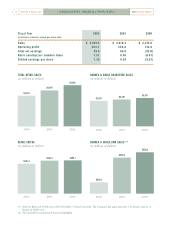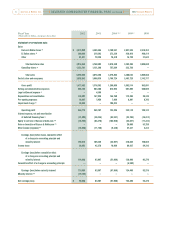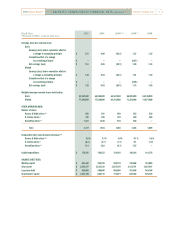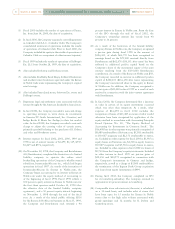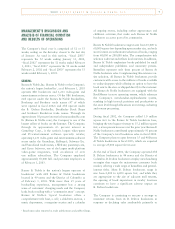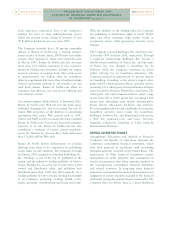Barnes and Noble 2002 Annual Report Download - page 15
Download and view the complete annual report
Please find page 15 of the 2002 Barnes and Noble annual report below. You can navigate through the pages in the report by either clicking on the pages listed below, or by using the keyword search tool below to find specific information within the annual report.
52 WEEKS ENDED FEBRUARY 1, 2003 COMPARED
WITH 52 WEEKS ENDED FEBRUARY 2, 2002
Sales
The Company's sales increased $398.9 million or 8.2%
during fiscal 2002 to $5.269 billion from $4.870 billion
during fiscal 2001. Contributing to this improvement was
an increase of $231.4 million from Video Game &
Entertainment Software store sales. Fiscal 2002 sales from
Barnes & Noble bookstores, which contributed 67.8% of
total sales or 91.3% of total bookstore sales, increased
6.4% to $3.575 billion from $3.359 billion in fiscal 2001.
The increase in bookstore sales was primarily attributable
to the 47 new Barnes & Noble stores opened during fiscal
2002. This increase was partially offset by declining sales
of B. Dalton, due to 47 store closings and a comparable
store sales decline of (6.4%) in fiscal 2002.
GameStop sales during fiscal 2002 increased to $1.353
billion from $1.121 billion during fiscal 2001. This increase
in sales was primarily attributable to the 11.4% growth in
GameStop comparable store sales and sales from the 210
new GameStop stores opened during fiscal 2002.
Cost of Sales and Occupancy
The Company's cost of sales and occupancy includes
costs such as rental expense, common area maintenance,
merchant association dues and lease-required advertising.
Cost of sales and occupancy increased $295.8 million,
or 8.3%, to $3.856 billion in fiscal 2002 from $3.560
billion in fiscal 2001, primarily due to growth in the
Video Game & Entertainment Software segment. The
Company's gross margin rate decreased slightly to 26.8%
in fiscal 2002 from 26.9% in fiscal 2001.
Selling and Administrative Expenses
Selling and administrative expenses increased $60.8
million, or 6.7%, to $965.1 million in fiscal 2002 from
$904.3 million in fiscal 2001, primarily due to the
increase in bookstore expenses from the opening of 47
Barnes & Noble stores in fiscal 2002 and to the growth
in the Video Game & Entertainment Software segment.
Selling and administrative expenses decreased to 18.3%
of sales in fiscal 2002 from 18.6% in fiscal 2001. This
decrease was primarily attributable to the lower selling
and administrative expenses, as a percentage of sales in
the Video Game & Entertainment Software segment.
Legal Settlement Expense
In fiscal 2001, the Company recorded a pre-tax charge of
$4.5 million in connection with a lawsuit brought by the
American Booksellers Association and 26 independent
bookstores. The charges included a settlement of $2.4
million paid to the plaintiffs and approximately $2.1
million in legal expenses incurred by the Company.
Depreciation and Amortization
Depreciation and amortization increased $0.9 million,
or 0.6%, to $148.7 million in fiscal 2002 from $147.8
million in fiscal 2001. The increase was primarily the
result of the increase in depreciation related to the 47
new Barnes & Noble bookstores opened during fiscal
2002. This increase was partially offset by the result of
the implementation of SFAS No. 142 in fiscal 2002,
whereby goodwill is no longer amortized but is
reviewed for impairment at least annually.
Pre-Opening Expenses
Pre-opening expenses increased in fiscal 2002 to $10.2
million from $8.0 million in fiscal 2001. The increase
in pre-opening expenses was primarily the result of
opening 47 new Barnes & Noble bookstores and 210
new GameStop stores during fiscal 2002, compared
with 40 new Barnes & Noble bookstores and 74 new
GameStop stores during fiscal 2001.
Impairment Charge
During the first quarter of fiscal 2002, the Company
deemed the decline in value in its available-for-sale
securities in Gemstar-TV Guide International, Inc.
(Gemstar) and Indigo Books & Music Inc. (Indigo) to be
other than temporary. The investments had been carried
at fair market value with unrealized gains and losses
included in shareholders’ equity. Events such as Gemstar’s
largest shareholder taking an impairment charge for
its investment, the precipitous decline in the stock
price subsequent to the abrupt resignation of one of its
senior executives, the questioning of aggressive revenue
recognition policies and the filing of a class action lawsuit
against Gemstar, were among the items which led to
management’s decision to record an impairment for its
investment in Gemstar of nearly $24.0 million (before
taxes). The Company’s decision to record an impairment
charge for its investment in Indigo was based on a review
of Indigo’s financial condition and historical share trading
data. As a result of these decisions, the Company recorded
a non-cash impairment charge to operating earnings of
[MANAGEMENT’S DISCUSSION AND
ANALYSIS OF FINANCIAL CONDITION AND RESULTS
OF OPERATIONS continued ]
14
2002 Annual ReportBarnes & Noble, Inc.


